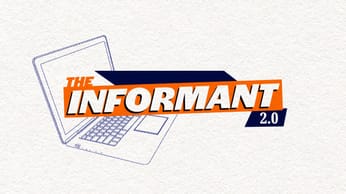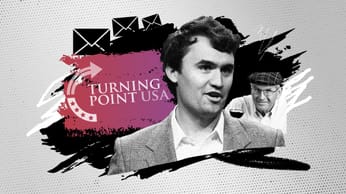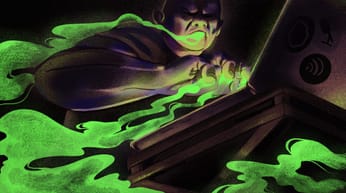
Cantwell Trial Day 1: Names get named
The first day of the neo-Nazi podcaster's trial begins with identities being confirmed, a juror being dismissed, and the FBI detailing a long investigation.
CONCORD, NEW HAMPSHIRE — It was just about everything you’d expect from Day 1 in the federal criminal trial of neo-Nazi podcaster Christopher Cantwell. Prosecutors and defense attorneys in the case delivered opening statements, a member of the public demanded to observe the trial without a face mask, the alleged victim is no longer known only by a pseudonym, and the defendant has been under surveillance by federal law enforcement since well before the crime for which he is charged.
If you haven’t already, check out our deep dive on the neo-Nazi feud at the center of the case.
1. The government’s opening
“This is an extortion case … about a white nationalist radio personality in New Hampshire who wanted to get something,” began Assistant U.S. Attorney John Davis at the government’s opening statement Tuesday morning. Davis quickly shifted gears, offering the first of many definitions handed to jurors on the first day of testimony. “You’ll hear a lot about doxing in this trial,” Davis told the jury. “When a person is doxed, the real world can come crashing down.” Davis went on to explain the nuts and bolts of the charged offenses.
Until Tuesday morning, filings in the case had referenced the alleged victim only by his online alias, “CheddarMane.” But in the opening statement, Davis used the man’s legal name, Ben Lambert, ending any question of his identity. (Lambert gave me a statement yesterday, which you can find here.) Lambert was described as a “Missouri father,” who, like Cantwell, is involved in the white nationalist movement. (As The Informant has reported, both men are neo-Nazis on opposite sides of a bitter feud within the movement.)
Davis also shed light on another previously unnamed individual — a former girlfriend of Cantwell’s who the government alleged visited Lambert’s home in November 2018, and who they say later supplied Cantwell with information and photographs they say he used to try to threaten and extort Lambert.
Davis' opening statement also offered a glimpse at what Lambert did after Cantwell allegedly threatened him via the social messaging app Telegram. Lambert, according to the government, telephoned and sent screenshots of the exchange to a “mentor of his.“ Davis identified the mentor as Paul Nehlen, a former Wisconsin congressional candidate who has recently found a home deep in the neo-Nazi movement.
2. The defense’s opening
“Chris Cantwell wanted to be left alone.” That’s how defense attorney Eric Wolpin began his opening statement to the jury. Wolpin then described how Cantwell had been “pushed, taunted, and harassed for months” by the mostly online neo-Nazi group known as the Bowl Patrol. It was this nonstop harassment, Wolpin said, and the lack of any assistance by the FBI to help put a stop to it, that pushed Cantwell to send the messages to Lambert.
As for Cantwell’s “sometimes racist language,” Wolpin told the jury: “He knows you will not like him because of what he has said.“ But, Wolpin emphasized, it was the Bowl Patrol that pushed Cantwell to “a breaking point,” giving him no viable option but to contact the FBI. And when Cantwell did just that? What did the FBI do? “They did nothing,” Wolpin told jurors. Wolpin said the Telegram messages at the heart of the case don’t constitute a crime. Cantwell used “the only type of language his harasser would understand.” Cantwell did not intend to commit extortion, Wolpin argued, saying: “It was never a true threat. It was bluster, exaggeration.”
3. The time Cantwell called a child abuse hotline
Part of what the government has alleged is that Cantwell threatened to report Lambert to a child abuse hotline — and then followed through with the threat. The government’s first witness of the trial was an employee of Missouri’s Department of Social Services, who testified about Cantwell’s call to their agency’s child abuse hotline. Cantwell, the government contended, was attempting to get Lambert investigated by any means — or agency — possible.
The employee testified remotely by video, and a recording of Cantwell’s call was played to the jury. Imagine, if you can, that you work at a Missouri child abuse hotline. You’re going about your day, doing a serious and important job, and then, Chris Cantwell calls. Cantwell’s behavior on the phone call can best be described as absolutely ridiculous. He had no actual information about Lambert’s children or the kind of danger they might have been in. He didn’t even know how many children Lambert had. But he launched into a long-winded and frankly incoherent explanation of the feud between Cantwell and the Bowl Patrol. To whoever answered that call, and had to listen to Cantwell whine about Paul Nehlen and “Vic Mackey” being mean to him, I am so sorry you had to go through that.
The Missouri Department of Social Services did not launch an investigation.
4. The surprisingly long FBI surveillance of Cantwell
It turns out the FBI began investigating Cantwell well before the June 2019 Telegram messages to Lambert. The FBI case agent testified that a pole camera had previously been installed near Cantwell’s home in Keene, New Hampshire, “because of an already ongoing investigation.” The camera was able to capture Cantwell’s comings and goings, something that came in handy in order to establish Cantwell’s physical location at the time of the Telegram exchange. (Exhibits presented on Tuesday showed he was in New Hampshire at the time the alleged threats were made. Being able to prove what state someone was in at the time you’re alleging they committed an interstate crime seems important!)
The existence of the pole camera wasn’t the only new information that came to light about the federal investigation into Cantwell. Documents obtained in recent days by The Informant show that Cantwell was also under physical surveillance across multiple states prior to June 2019. The seemingly sweeping investigation into Cantwell involved the Keene Police Department, the Manchester Police Department, the New Hampshire State Police, multiple FBI offices, cooperating individuals, and physical and electronic surveillance, according to these documents.
5. The many times Cantwell tried to get the FBI to investigate his enemies
We already knew from pre-trial testimony the extent to which Cantwell had been in contact with the Keene Police Department. (He emailed them more than 50 times in a four-month period in the summer of 2019.) Testimony today revealed that Cantwell was also frequently contacting federal law enforcement.
Apparently unaware he was the subject of an ongoing investigation, Cantwell began sending information to the FBI about the Bowl Patrol. The testimony is backed up by court documents obtained by The Informant, which say Cantwell sent the FBI dozens of emails, “providing voluminous information, which he claimed supported the harassment allegations.” In one email Cantwell sent to the FBI, he wrote: “I’m typically in compliance with the law.”
6. The naming of names
The FBI case agent confirmed some long-suspected identities of individuals associated with Bowl Patrol. Most of the names had already been outed by anti-racist activists. But this was the first time the FBI had connected real names to online identities. “Mosin Nagant” is Dallas Medina. “Uncle Paul” is Paul Nehlen. “Hardmaus” is Thomas Gipson. “Illegal Aryan” is Mark Reardon. “Wignasty” is David Fassler. And, last but not least, “Vic Mackey,” the leader of the Bowl Patrol, is Andrew Casarez.
7. The juror who was dismissed on the first day
Just after opening statements concluded, with the rest of the jury out of the courtroom, one female juror took the stand and explained that she had prior knowledge of the case. The juror said that during jury selection she thought the last name of the defendant was “Cantrell.” But upon seeing Cantwell in court and hearing his name, the juror said she actually knew the kind of information about him that would disqualify her.
She explained that her hometown is Charlottesville, Virginia, and that she had direct involvement as a University of Virginia employee in the response to the events surrounding the 2017 “Unite the Right” rally at which Cantwell participated in violence. The juror went so far as to mention “the murder of Heather Heyer,” an anti-racist activist who was killed when another neo-Nazi plowed his car into a group of counter-protestors.
The juror was dismissed.
8. The Free Stater who refused to mask up
No Cantwell story would be complete without a wacky angle involving Keene, New Hampshire. Ian Freeman, a radio show host and member of the Free State Project, arrived before opening statements. Freeman had planned to attend the proceedings and was even reserved a courtroom seat by Cantwell. But he objected to wearing a face mask, telling court personnel vaguely that he had a medical condition. When asked for additional information or any documentation, or even to explain the medical condition from which he suffered, Freeman refused.
Freeman also claimed to be a minister and said “mask wearing is inconsistent with his religious views,” the judge told the courtroom. The judge denied Freeman entry while he considered a proposal that would involve a private viewing area for Freeman. The judge later attempted to compromise with Freeman. But it was to no avail. Freeman wouldn’t budge. Then Freeman demanded a written ruling. The judge literally told the courtroom that he has no time for this, and suggested Freeman could always file a writ of mandamus with the U.S. Court of Appeals. This is the most Keene thing I’ve ever witnessed in federal court. Way to spice up the day, Ian! Send me that writ!
9. Great explanations
I’d just like to say to the FBI and the attorneys in this case that I’m wildly impressed with the great definitions offered up in court today. Telegram! Incels! Doxing! Avatars! Bowl Patrol! Keep up the great work!
10. The trial continues on Wednesday
The government's second witness, the FBI agent assigned to the investigation, is expected to continue his testimony Wednesday. Also expected is testimony from the alleged victim, Ben Lambert, aka CheddarMane.
Hilary Sargent is a freelance journalist. She has written for The New York Times, QUARTZ, The Boston Globe, and The Wall Street Journal. Follow her on Twitter at @lilsarg.
Illustration by Colleen Tighe.
If you value this work, please be sure to tell a friend or colleague about it and encourage them to sign up. Feeling generous? You can also give someone a gift subscription to The Informant.
Subscribe to The Informant to receive the latest updates.





